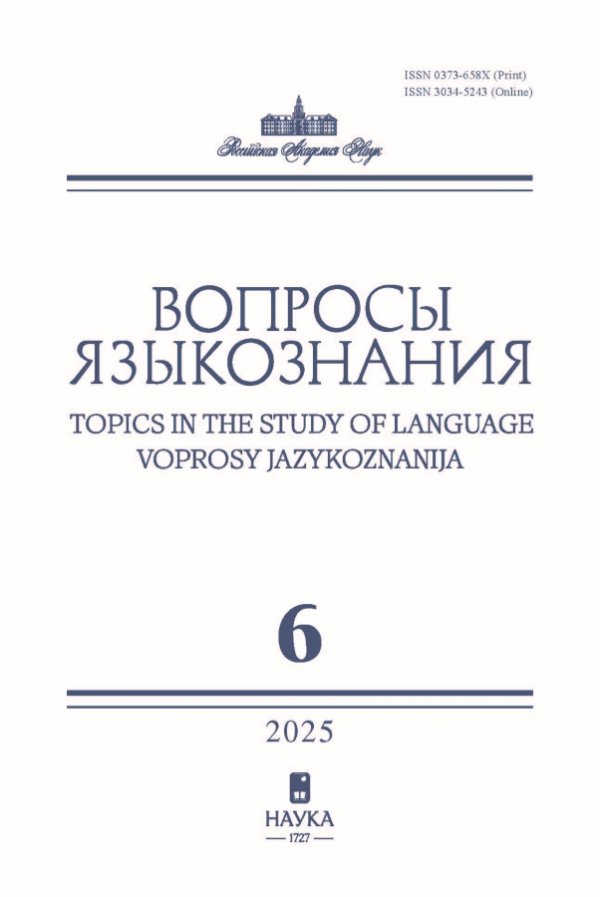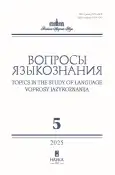The construction kak-to tak as a discourse marker
- Authors: Apresjan V.Y.1
-
Affiliations:
- Dartmouth College
- Issue: No 5 (2025)
- Pages: 11–29
- Section: Special issue in memory of Leonid L. Iomdin
- URL: https://bakhtiniada.ru/0373-658X/article/view/309284
- DOI: https://doi.org/10.31857/0373-658X.2025.4.11-29
- ID: 309284
Abstract
The article analyzes discourse functions of the expression kak-to tak ('kind of like that'), which encompass anaphora, deixis, hesitation, evaluation, and summation. These functions can be divided into referential, structural, and cognitive. The semantics of the marker arises from the interaction of two components: the indefiniteness associated with kak-to ('somehow') and the deixis conveyed by tak ('like that'). The deictic component dominates in anaphoric, deictic, and summative uses, while the indefinite component is more prominent in hesitative and evaluative contexts. Each function is associated with distinct syntactic, prosodic, and even gestural features. The construction kak-to tak exhibits a development from compositional usages to a grammaticalized discourse marker. While this evolutionary path is typical for demonstrative pronouns, it is rarely described for combinations involving indefinite elements. Diachronic analysis shows that the summative function is the most recent, whereas the other functions are already attested in 19th-century texts, where the evaluative use initially predominated.
Keywords
References
- Apresjan Yu. D., Lopukhina A. A. Vyjti. Aktivnyi slovar’ sovremenogo russkogo yazyka. Vol. 2: V—G. Apresjan Yu. D. (ed.). Moscow: Yazyki slavyanskoi kul’tury, 2014, 423–429.
- Apresjan V. Yu. Tut, zdes’ i sejčas: On temporal meanings of deictic spatial words. Russkij jazyk v nauchnom osveshchenii, 2014, 27: 9–41.
- Baranov A. N., Plungian V. A., Rakhilina E. V. Putevoditel’ po diskursivnym slovam russkogo yazyka
- Bogdanova-Beglaryan N. V. Pragmaticheskie markery russkoi povsednevnoi rechi
- Boguslavskaya O. Yu. Development of polysemy of anaphoric adjectives. Proceedings of the V. V. Vinogradov Russian Language Institute, 2020, 3(25): 168–179.
- Boguslavsky I. M. Issledovaniya po sintaksicheskoi semantike: sfery deistviya logicheskikh slov
- Iomdin L. L. Big issues of small syntax. Komp’yuternaya lingvistika i intellektual’nye tekhnologii. Proceedings of the international conference «Dialogue 2003». Kobozeva I. M (ed.). Moscow: Russian State Univ. for the Humanities, 2003, 216–222.
- Iomdin L. L. Polysemous syntactic phrasemes: Between vocabulary and syntax. Komp’yuternaya lingvistika i intellektual’nye tekhnologii. Proceedings of the international conference «Dialogue 2003». Laufer N. I., Narin’yani A. S., Selegei V. P. (eds.). Moscow: Russian State Univ. for the Humanities, 2006, 202–206.
- Iomdin L. L. Russian constructions of the small syntax formed by question pronouns. Mir russkogo slova i russkoe slovo v mire. Proceedings from the 11th Congress of the International Association of Teachers of Russian Language and Literature. Vladova I., Manchev Vl. (eds.). Sofia: Heron Press, 2007, 117–126.
- Iomdin L. L. In the depths of microsyntax: A lexical class of syntactic idioms. Computational Linguistics and Intellectual technologies. Papers from the Annual International Conference “Dialogue 2008”, 7(14): 178–184.
- Iomdin L. L. Syntactic phrasemes: Between lexicon and grammar. Teoreticheskie problemy russkogo sintaksisa: Vzaimodeistvie grammatiki i slovarya. Apresjan Yu. D., Boguslavsky I. M., Iomdin L. L., Sannikov V. Z.; Apresjan Yu. D. (ed.). Moscow: Yazyki slavyanskikh kul’tur, 2010, 141–190.
- Iomdin L. L. Microsyntactic constructions formed by the Russian lexeme raz. SLAVIA: časopis pro slovanskou filologii, 2015, 3(84): 291–306.
- Kibrik A. A., Podlesskaya V. I. Discourse markers in the structure of oral narrative: A corpus study. Computational Linguistics and Intellectual Technologies. Papers from the Annual International Conference “Dialogue 2009”, 8(15): 390–395.
- Kiseleva K., Paillard D. Diskursivnye slova russkogo yazyka: opyt kontekstno-semanticheskogo opisaniya
- Levontina I. B. Chastitsy rechi
- Russian National Corpus. http://www.ruscorpora.ru.
- Прагматикон — Yaskevich A., Bychkova P., Koziuk E., Rakhilina E., Slepak E., Utkina A., Zhukova S., Zotova T. The Russian Pragmaticon. An electronic database of the Russian pragmatic constructions. https://pragmaticon.ruscorpora.ru/.
- Rudnitskaya E. L. Some classes of sentential adverbs in Russian. Semantics. Syntax. Lexicography. Voprosy Jazykoznanija, 1994, 1: 114–125.
- Krysin L. P. (ed.). Tolkovyi slovar’ russkoi razgovornoi rechi
- Shvedova N. Yu. The sentential object and sentential adverb as independent sentence modifiers. Voprosy Jazykoznanija, 1964, 6: 77–93.
- Shmelev A. D. The particle tak as a marker of an “insignificant detail”. Yazyk kak materiya smysla: Collection of papers on the 90th anniversary of Academician Natalia Yu. Shvedova. Lyapon M. V. (ed.). Moscow: V. V. Vinogradov Russian Language Institute of the Russian Academy of Sciences, 2007, 208–216.
- Brown, Levinson 1987 — Brown P., Levinson S. C. Politeness: Some universals in language usage. 2nd edn. Cambridge: Cambridge Univ. Press, 1987.
- Chafe 1994 — Chafe W. Discourse, consciousness, and time: The flow and displacement of conscious experience in speaking and writing. Chicago: The Univ. of Chicago Press, 1994.
- Diessel 1999 — Diessel H. Demonstratives: Form, function, and grammaticalization. Amsterdam; Philadelphia: John Benjamins, 1999.
- Heine 2013 — Heine B. On discourse markers: Grammaticalization, pragmaticalization, or something else? Linguistics, 2013, 6(51): 1205–1247.
- Heine et al. 2021 — Heine B., Kaltenböck G., Kuteva T., Long H. The rise of discourse markers. Cambridge: Cambridge Univ. Press; 2021.
- Himmelmann 1996 — Himmelmann N. Demonstratives in narrative discourse: A taxonomy of universal uses. Studies in anaphora. Fox B. A. (ed.). Amsterdam; Philadelphia: John Benjamins, 1996, 205–254.
- Himmelmann 1997 — Himmelmann N. Deiktikon, Artikel, Nominalphrase: zur Emergenz syntaktischer Struktur. Tübingen: Niemeyer, 1997.
- König 2020 — König E. Beyond exophoric and endophoric uses: Additional discourse functions of demonstratives. Demonstratives in discourse. Næss Å., Margetts A., Treis Y. (eds.). Berlin: Language Science Press, 2020, 21–42.
- Kuteva et al. 2019 — Kuteva T., Heine B., Hong B., Long H., Narrog H., Rhee S. World Lexicon of Grammaticalization. 2nd edn. Cambridge: Cambridge Univ. Press, 2019.
- Maschler 1998 — Maschler Y. Rotsè lishmoa kéta? ‘Wanna hear something weird/funny?’: Segmenting Israeli Hebrew talk-in-interaction. Discourse markers: Descriptions and theory. Jucker A. H., Ziv Y. (eds.). Amsterdam; Philadelphia: John Benjamins, 1998, 13–60.
- Nahkola et al. 2020 — Nahkola T., Reile M., Taremaa P., Pajusalu R. Space, contrast and joint attention: Demonstrative adverbs in Russian, Estonian and Finnish. Demonstratives in discourse. Næss Å., Margetts A., Treis Y. (eds.). Berlin: Language Science Press, 2020, 243–272.
- Næss et al. 2020 — Næss Å., Margetts A., Treis Y. Introduction: Demonstratives in discourse. Demonstratives in discourse. Næss Å., Margetts A., Treis Y. (eds.). Berlin: Language Science Press, 2020, 1–20.
- Schiffrin 1987 — Schiffrin D. Discourse markers. Cambridge: Cambridge Univ. Press, 1987.










